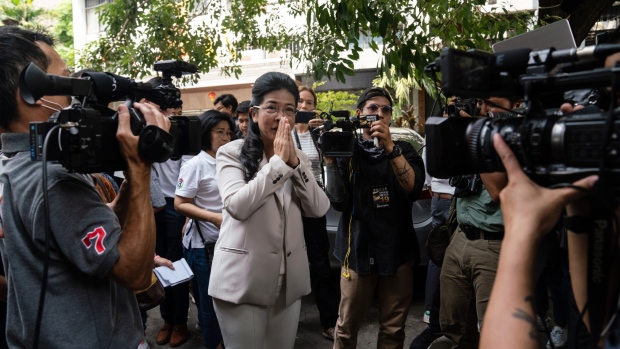Mar 25, 2019
Thaksin Allies Claim Victory in Thai Election, Challenging Army
, Bloomberg News

(Bloomberg) -- A political party linked to exiled tycoon Thaksin Shinawatra claimed victory in Thailand’s election and said it would seek to form a government, challenging a military-backed group that led in initial vote counts.
Pheu Thai won the most seats in the election and the military-appointed Senate should follow the wishes of voters, Sudarat Keyuraphan, the party’s candidate for prime minister, told reporters in Bangkok on Monday. While local news outlets showed the party winning the most seats, election authorities still haven’t released official tallies.
“We’ll try to form a government coalition right away because that’s how people voted,” Sudarat said. “We stood by our position that we won’t support the continuation of the military regime.”
The comments indicate a showdown is emerging to form a government between pro-democracy forces and Thailand’s royalist and military elites, who have repeatedly sought to prevent Thaksin and his allies from taking power over the past two decades. Previous confrontations have led to instability, gridlock, deadly street protests and coups.
The military-backed Palang Pracharath party won 7.7 million votes with 94 percent counted, according to unofficial results posted on the Election Commission’s Facebook page. Pheu Thai came in second with 7.23 million votes. The Election Commission said on Monday it would announce the winners of 350 constituencies at 4 p.m., after several delays in giving seat totals.
Investors appeared sanguine about the results of the election. The baht strengthened as much as 0.8 percent against the dollar, while the benchmark stock index’s drop was less than the slide in regional peers amid a global selloff.
The results put junta chief Prayuth Chan-Ocha in position to stay in power, as Thailand’s election rules effectively tilt the playing field in favor of the military. The 250-member Senate appointed by the junta also gets a vote for prime minister, and it’s likely to back Prayuth.
Either way, any coalition is likely to be weak and unwieldy, making it difficult to pass legislation in the lower house. Both Pheu Thai and Prayuth would need to rely on a range of smaller regional parties to push through key policies.
To contact the reporter on this story: Siraphob Thanthong-Knight in Bangkok at rthanthongkn@bloomberg.net
To contact the editor responsible for this story: Daniel Ten Kate at dtenkate@bloomberg.net
©2019 Bloomberg L.P.






